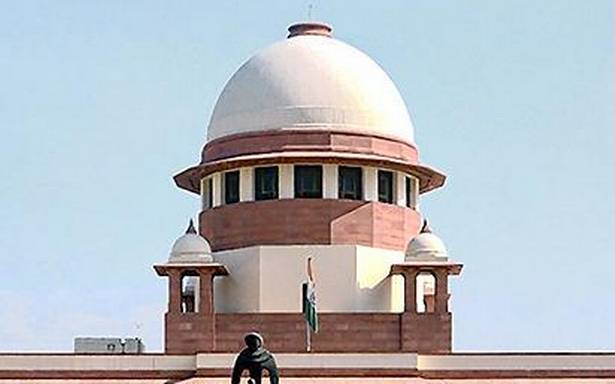Centre says focus is on utilising funds for food, medical care, oxygen, vaccination and pumping up economy.
The Supreme Court on Monday asked the government whether it has taken a “decision” to not pay ex gratia to families who lost their loved ones to COVID-19.
“Is there any decision taken that there is no need to pay ex gratia? Is there a decision or is it a case of ‘no decision” Justice Ashok Bhushan asked Solicitor General Tushar Mehta.
“Where is the decision that there is no need for ex gratia?”, Justice M.R. Shah, the other judge on the Bench, also enquired. He even asked whether the government, by maintaining that COVID-19 was not a “one-time disaster”, was inferring that the Disaster Management Act would not apply to the pandemic.
The questions from the Bench came even as the Union government clarified that it had money, but the focus was on utilising funds for food, medical care, oxygen, vaccination and pumping up the economy rather than pay a one-time compensation of ₹4 lakh each to families of people who died of COVID-19.
‘Twisted on Twitter’
“It is not that we do not have money… It is that our focus is rather on expenditure of money for other things [like public health interventions, social protection and economic recovery for the affected communities, etc],” Mr. Mehta submitted. He said the contents of the government’s June 19 affidavit, explaining its financial priorities for COVID-19 management, was “twisted” and misrepresented on Twitter.
Justice Shah said the government need not defend itself in court against what was said on Twitter. He, however, agreed that Mr. Mehta was right to clarify. “To say that the Centre has no money has wide repercussions,” he observed.
Senior advocate S.B. Upadhyay, for the petitioners, said, “But if they do have the money, why should they not comply with their statutory obligation under Section 12 of the Disaster Management Act to provide ex gratia assistance to COVID-19 victims?”. The government had itself declared COVID-19 a national disaster, he submitted.
The petitioners have highlighted a 2015 notification, which requires the government to pay an ex gratia of ₹ 4 lakh each to victims’ families under Section 12. The Centre cannot cite financial constraints to elude its statutory duty to pay compensation now, Mr. Upadhyay contended.
Justice Shah, highlighting the petitioners’ argument for framing uniform guidelines on disaster compensation, reasoned that disasters and pandemics varied in impact. One relief cannot fit all tragedies.
Varied impact of disasters
“Every disaster has a different impact. There may be a big or a small disaster. There may be a big or a small pandemic. There may be a flood where the victims are less. The gravity of a global pandemic is high. You cannot apply the same standards of a small disaster or a smaller pandemic to a global pandemic,” he addressed Mr.Upadhyay.
But Mr.Upadhyay persisted that “financial constraints” or the excuse that payment of compensation would dry up the Central government’s and the States resources could not be made a ground by the government to avoid its obligation under a statute to pay ex gratia.
Advocate Gaurav Kumar Bansal, a petitioner, said, “The amount can be less small or big, but some help needs to be given to families, some of whom have lost their sole breadwinners. Families of frontline warriors who lost their lives in the line of duty cannot be left in a lurch”.
Mr. Mehta said Section 12 was only “recommendatory” in nature. He argued that the Disaster Management Act has moved away from one-time cash reliefs to larger issues of wider impact such as preparedness, risk management, mitigation, rehabilitation and reconstruction. “Instead of giving one-time relief, we have gone for a multi-pronged approach. We have prioritised on preparedness. This is not a one-time disaster,” he submitted.
Finance Commission report
Mr. Mehta referred to the 15th Finance Commission report for 2021-2026 to argue that the funds for disaster management and their allocations were already fixed.
Justice Shah asked, “So, the Finance Commission fixes ₹15,000 crore on disaster management. Then COVID-19 happens. You need ₹25,000 crore on disaster management. Can you say that you will only spend ₹15,000 crore?”.
Mr. Mehta replied, “We will have to go back to Parliament. It will have to be ratified by Parliament”.
Justice Shah stated, “Remember, a Finance Commission report cannot override a statutory provision [Section 12]. You just need to keep in mind the broad aspects of the Finance Commission report while framing further guidelines [for COVID-related funding]”.
The court has reserved the petitions for judgment. eom
Source: Read Full Article

